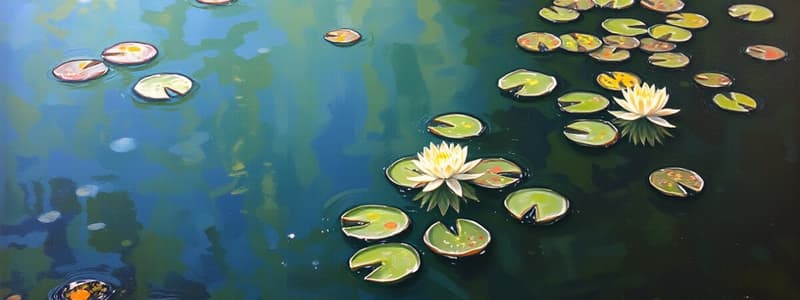Podcast
Questions and Answers
What percentage of Earth's water is found in the form of salty water in oceans, seas, and salt lakes?
What percentage of Earth's water is found in the form of salty water in oceans, seas, and salt lakes?
- 97% (correct)
- 3%
- 70%
- 50%
Which component of Earth's spheres refers specifically to frozen water?
Which component of Earth's spheres refers specifically to frozen water?
- Lithosphere
- Cryosphere (correct)
- Hydrosphere
- Atmosphere
Which of the following unique properties of water supports life?
Which of the following unique properties of water supports life?
- Water can only exist in liquid form.
- Water is volatile at room temperature.
- Water can dissolve only organic substances.
- Water exists in all three states of matter. (correct)
What impact do chemical reactions in water primarily have?
What impact do chemical reactions in water primarily have?
Why is water essential for the continuity of life on Earth?
Why is water essential for the continuity of life on Earth?
What is a key element of the water cycle that contributes to cloud formation?
What is a key element of the water cycle that contributes to cloud formation?
What percentage of the mass of a water molecule is contributed by oxygen?
What percentage of the mass of a water molecule is contributed by oxygen?
Why is water not found in a pure form on the surface of the Earth?
Why is water not found in a pure form on the surface of the Earth?
What structural feature contributes to the polarity of the water molecule?
What structural feature contributes to the polarity of the water molecule?
What causes water molecules to form hydrogen bonds?
What causes water molecules to form hydrogen bonds?
What is the boiling point of water at sea level?
What is the boiling point of water at sea level?
Which process allows for the formation of underground water?
Which process allows for the formation of underground water?
How do water molecules interact with ionic compounds like sodium chloride?
How do water molecules interact with ionic compounds like sodium chloride?
Flashcards are hidden until you start studying
Study Notes
Aquatic Ecosystem Overview
- Water is essential for life, undergoing various chemical reactions that influence water quality and the health of aquatic organisms.
Unique Properties of Water
- Water can dissolve a wide range of chemical substances due to its molecular structure.
- Exists in three states: solid, liquid, and gas, within the temperature range of Earth's surface.
- Critical for life continuity:
- Transports materials needed for energy production into cells.
- Facilitates waste removal from cells back into the environment.
Earth's Spheres
- Hydrosphere: Contains liquid water, covers about 70% of Earth's surface; 97% salty (oceans, seas); 3% fresh (rivers, lakes, groundwater).
- Atmosphere: Encompasses air and water vapor in a gaseous state.
- Cryosphere: Comprises frozen water found in polar regions, mountains, and glaciers.
Water Cycle (Hydrological Cycle)
- A closed system through which water moves in various forms:
- Evaporation: Water transforms into vapor, forming clouds.
- Biological processes: Includes transpiration in plants and respiration in animals.
- Precipitation: Rain or snow falls, replenishing water sources.
- Percolation: Water seeps through soil and rocks, forming underground water.
Chemical Structure of Water
- Chemical formula: H₂O, consisting of two hydrogen atoms and one oxygen atom.
- Ratio: 2:1 by volume, 1:8 by mass (11.11% hydrogen, 88.89% oxygen).
- The angle of hydrogen-oxygen bonds measures 104.5°.
Chemical Properties of Water
- Not found in pure form on Earth due to ions and other chemicals present.
- Key properties include:
- Polarity: Oxygen's higher electronegativity creates partial charges, allowing water to form hydrogen bonds and dissolve other polar substances.
- Hydrolysis: Involves breaking down compounds in water.
- Acid-base balance: Regulates pH in aquatic environments.
Example of Solubility
- Sodium chloride (NaCl) dissolves in water, dissociating into Na⁺ and Cl⁻ ions.
Boiling Point
- Water's boiling point (100°C) is significantly higher than that of hydrogen sulfide (H₂S) at -61°C, due to hydrogen bonding and water's unique properties.
Studying That Suits You
Use AI to generate personalized quizzes and flashcards to suit your learning preferences.





